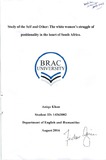| dc.contributor.advisor | Azim, Firdous | |
| dc.contributor.author | Khan, Aniqa | |
| dc.date.accessioned | 2017-05-24T06:36:43Z | |
| dc.date.available | 2017-05-24T06:36:43Z | |
| dc.date.copyright | 2016 | |
| dc.date.issued | 2016-08 | |
| dc.identifier.other | ID 14363002 | |
| dc.identifier.uri | http://hdl.handle.net/10361/8179 | |
| dc.description | This thesis is submitted in partial fulfillment of the requirements for the degree of Masters of Arts in English, 2016. | en_US |
| dc.description | Cataloged from PDF version of thesis. | |
| dc.description | Includes bibliographical references (page 58-62). | |
| dc.description.abstract | This dissertation will primarily focus on how colonialism created the binaries of the colonizer (Self) and the colonized (Other). The dichotomy, not only did it divide the geographical locations of East and West, or separated racial identities into black or white, but also separates gender into Self and Other. The socially constructed nature of women, their treatment and social roles are at the core of their otherness where they are colonized, both by imperial ideologies and patriarchal domination. My dissertation will focus on the three novels that are concerned with South Africa: Doris Lessing's The Grass is Singing (1950), Nadine Gordimer's Julys People (1981) and J.M. Coetzee's Disgrace (1999). | en_US |
| dc.description.statementofresponsibility | Aniqa Khan | |
| dc.format.extent | 62 pages | |
| dc.language.iso | en | en_US |
| dc.publisher | BRAC University | en_US |
| dc.rights | BRAC University thesis are protected by copyright. They may be viewed from this source for any purpose, but reproduction or distribution in any format is prohibited without written permission. | |
| dc.subject | White women | en_US |
| dc.subject | South Africa | en_US |
| dc.title | Study of the self and other: the white women's struggle of positionality in the heart of South Africa | en_US |
| dc.type | Thesis | en_US |
| dc.contributor.department | Department of English and Humanities, BRAC University | |
| dc.description.degree | M.A. in English | |

